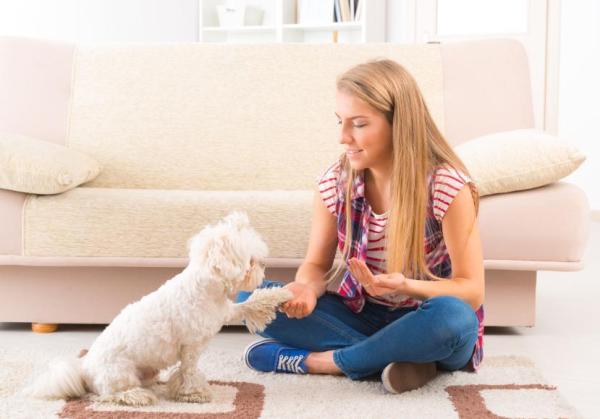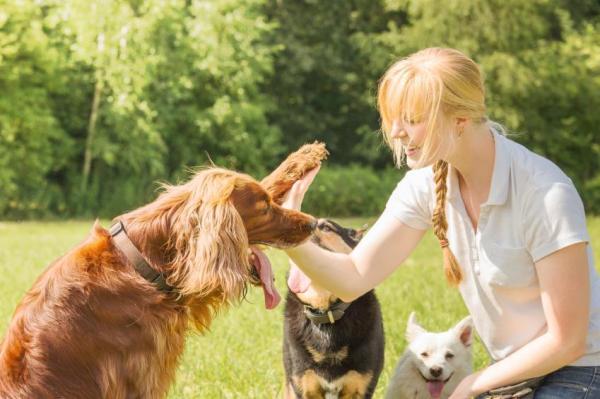Tips to Train a Mixed-Breed Dog



See files for Dogs
Educating or training a dog can be different depending on the breed; some have a tendency to pay attention, others to get distracted. However, regardless of how long it takes for them to learn, all dogs must be trained following the same principles, which will allow them to interact with others and stay safe in their daily activities.
In this AnimalWised article we'll share some general tips to train a mixed-breed dog. All dogs are capable of learning, and mixed-breed or crossbred or designer dogs do not have more difficulties than pedigree dogs. A dog's struggle to pay attention and learn depends on their genetic code, individual personality and environment. Read on!
Training a mixed-breed puppy
To begin with, a puppy of any dog breed or type should be socialized during the early stages of their life. This should be done right after they have got all of their vaccinations. At this point you should allow your puppy to interact with other sociable dogs so they can learn how to behave and play with them. It is very important to prevent future behavioral problems.
In the same way, you should allow your puppy to play with other people and go on walks so they can discover the environment. This process should be carried out gradually, but it's a very good way to make sure that your dog isn't scared of things.
This is a good time to teach your mixed-breed puppy other necessary abilities such as urinating in the street, playing with teething toys or staying home alone, among others. It is essential for the whole family to be involved in the dog's training or, at least, to understand what the dog's limits are. You should all be consistent on whether the puppy can jump on the sofa or not, etc.
Providing lots of love and care is the main thing at this point. Remember that puppies of all breeds and types take a while to learn things.

Training an adult mixed-breed dog
Even when adopted as an adult, dogs of all breeds must learn basic training commands, including:
- Sit
- Stay
- Come
- Heel
It is very important to dedicate enough time to training your dog. This will be essential in preventing accidents and keeping the dog safe. However, it will also be important to strengthen your relationship with your pet and to avoid unwanted behaviors such as over-protection.
Dedicate 10 to 15 minutes every day to training your mixed-breed dog. More time may overload the dog with information. Always use positive reinforcement so that your dog knows what they are doing is right. Training should be a fun activity for both of you. Don't worry if your dog doesn't pick things up quickly, just keep repeating it.

Training your dog to go for walks
You should walk your dog at least 2 to 3 times a day to keep them in shape, allowing them to sniff, urinate and exercise as often as they needs. Lots of people don't understand that a walk is the "dog's own time", and try to stop them from pulling the lead with harsh tugs. This is a poor attitude. Consider the most common things you do wrong when you walk your dog and try to avoid them; you will see how your dog's attitude improves little by little.

Advanced training for mixed-breed dogs
Once you have a good relationship with your dog and they have learnt the basic commands, you can start considering advanced training to make your dog feel useful and mentally stimulated. Advanced training is very beneficial for dogs of all ages and types, and you'll have the time of your life showing your pet new tricks.
Unlike pedigree standard contests, mixed-breed and crossbred dogs can participate in all dog sports, including Agility and Canicross.

Fun and games
Of course, fun and games help your dog be happy and feel at ease, which in turn helps in keeping them healthy. Playing ball games, doing exercise or teaching them some intelligence games at home are great, highly recommended ideas. Don't let your dog spend the day sleeping and doing nothing.

Turn to a professional if necessary
Dogs can suffer from behavioral problems if they're suffering from trauma, if they haven't been properly socialized or if they're suffering from severe stress.
In this case, it is imperative to go to a professional who can treat this. Why? Many people "diagnose" their dog's problems themselves: this is a serious error. What these people don't know is that they might be misreading the warning signs that their dog is sending them, and applying the wrong treatment can make the situation much worse. Of course, you should do your own research, but never act on it without proper preparation.
Canine ethologists and dog trainers are the main people to help you in this case - don't penny pinch if your dog's health and happiness are at stake.

As you can see, there is no difference in training between mixed-breeds and pedigree dogs. Make an effort to give your pet lots of love and a positive training. In return, you will receive a lifelong faithful companion.
AnimalWised congratulates you for not being hung up on the breed and adopting a dog regardless of their look or origins. Best of luck!
If you want to read similar articles to Tips to Train a Mixed-Breed Dog, we recommend you visit our Basic education category.











